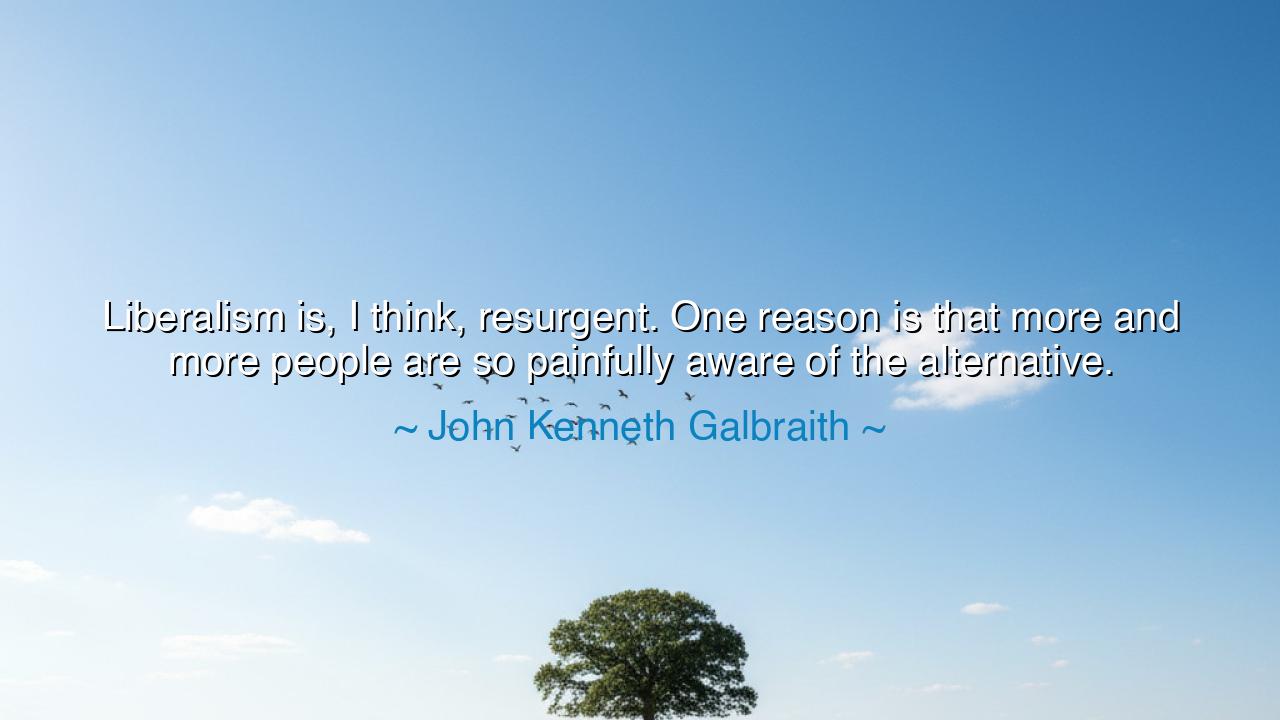
Liberalism is, I think, resurgent. One reason is that more and
Liberalism is, I think, resurgent. One reason is that more and more people are so painfully aware of the alternative.






John Kenneth Galbraith, the sage of economics and sharp critic of power, once proclaimed: “Liberalism is, I think, resurgent. One reason is that more and more people are so painfully aware of the alternative.” These words, uttered in an age of turmoil, remind us that human hearts turn toward freedom and compassion not in idle luxury, but when they have felt the crushing weight of oppression. The resurgence of liberalism is not a gift freely chosen by nations, but the inevitable answer to the darkness revealed by its opposite.
To speak of liberalism is to speak of belief in human dignity, in fairness, in the responsibility of society to protect the weak as well as empower the strong. Galbraith, having lived through depression, war, and the struggles of inequality, saw clearly that when men and women taste the bitterness of exploitation and tyranny, their eyes open to the necessity of compassion in governance. For only after stumbling through the shadow can one truly long for light.
History offers us the terrible lesson of the Great Depression. When the markets collapsed and millions were left destitute, the old doctrines of unrestrained markets proved hollow. It was then that Franklin D. Roosevelt’s New Deal—the embodiment of liberal reform—arose as salvation. Social security, labor protections, and public works became not luxuries, but necessities born from pain. The people, “painfully aware of the alternative” of unchecked ruin, embraced liberalism as the shield against despair.
The same truth was seen in the aftermath of World War II. Fascism, the cruelest alternative to freedom, had scarred the earth with blood and ash. From that horror came renewed dedication to liberal democracy and institutions designed to safeguard peace. The United Nations, the welfare state in Europe, and the civil rights movements that followed were all nourished by the memory of what happens when men forget compassion and surrender to tyranny.
Therefore, O keepers of memory, learn from Galbraith’s wisdom. Do not despise the resurgence of liberalism, for it rises from the wounds of history. When the world forgets its value, it need only look at the ruins left by its alternative—poverty, cruelty, oppression—to remember why it is needed. Let his words be a warning: only vigilance and compassion can preserve the freedoms we cherish. For light is most precious to those who have walked through the longest night.






HLHA HAI LINH
Is the resurgence of liberalism a reflection of a changing public consciousness or a mere rejection of the alternative? If more people are turning to liberalism because they fear what could happen under other political ideologies, how sustainable is that support? Does this imply that liberalism is less about ideological victory and more about finding a safer option in a politically turbulent world?
KKhoi
How much of the appeal of liberalism today is based on the idea that it’s the 'lesser evil' compared to other political systems? Galbraith seems to be suggesting that liberalism’s current rise is largely due to fear and dissatisfaction with the alternatives. If this is the case, is liberalism truly in a resurgent state, or is it just a temporary refuge from worse options? How can liberals solidify their platform as a strong and positive force for change?
KTDoan Khanh Tue
In Galbraith's view, does the resurgence of liberalism signify a broader political trend where ideologies become stronger as their opponents become more alarming? If so, what does this mean for the quality of political debate and decision-making? Is it healthy for political systems to be driven more by fear of the alternative than by a positive vision for the future? How can societies move beyond fear-based politics?
QMNguyen Quang Minh
Could the resurgence of liberalism, according to Galbraith, be a sign of dissatisfaction with the current political environment? If people are turning to liberalism because they are so aware of the potential dangers of other systems, is it possible that liberal policies are gaining traction due to fear rather than genuine enthusiasm for their benefits? How might this impact the future direction of political discourse?
NTNguyen Thanh
What does Galbraith mean by 'the alternative'? Is he referring to conservative or authoritarian policies, or something else entirely? If people are turning to liberalism because they fear the alternative, does this suggest that liberalism may not be as convincing or compelling on its own merits, but rather as a countermeasure to perceived dangers? What does this tell us about how political ideologies shift during times of uncertainty?